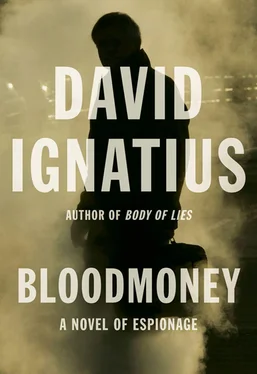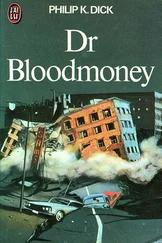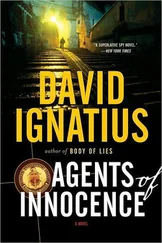David Ignatius - Bloodmoney
Здесь есть возможность читать онлайн «David Ignatius - Bloodmoney» весь текст электронной книги совершенно бесплатно (целиком полную версию без сокращений). В некоторых случаях можно слушать аудио, скачать через торрент в формате fb2 и присутствует краткое содержание. Жанр: Шпионский детектив, на английском языке. Описание произведения, (предисловие) а так же отзывы посетителей доступны на портале библиотеки ЛибКат.
- Название:Bloodmoney
- Автор:
- Жанр:
- Год:неизвестен
- ISBN:нет данных
- Рейтинг книги:4 / 5. Голосов: 1
-
Избранное:Добавить в избранное
- Отзывы:
-
Ваша оценка:
- 80
- 1
- 2
- 3
- 4
- 5
Bloodmoney: краткое содержание, описание и аннотация
Предлагаем к чтению аннотацию, описание, краткое содержание или предисловие (зависит от того, что написал сам автор книги «Bloodmoney»). Если вы не нашли необходимую информацию о книге — напишите в комментариях, мы постараемся отыскать её.
Bloodmoney — читать онлайн бесплатно полную книгу (весь текст) целиком
Ниже представлен текст книги, разбитый по страницам. Система сохранения места последней прочитанной страницы, позволяет с удобством читать онлайн бесплатно книгу «Bloodmoney», без необходимости каждый раз заново искать на чём Вы остановились. Поставьте закладку, и сможете в любой момент перейти на страницу, на которой закончили чтение.
Интервал:
Закладка:
Barkin, still astonished, sputtered a response.
“I protest, on behalf of my agency. We have done nothing wrong.”
“Thank you, Mr. Barkin. This is nothing personal, I assure you. Now you should leave. I fear that Pakistanis will be very angry. I would not be surprised if there were demonstrators tomorrow at the entrance to the diplomatic zone near your embassy, expressing their outrage. The embassy should take precautions, I think.”
12
The Dubai Airport had a hungover, half-deserted look when Marx arrived. She made her way past bleary-eyed South Asians in transit, who were wandering up and down the corridor like weary birds looking for a place to alight. The customs hall was nearly empty, except for the Filipina “Marhaba” girls who were arrayed to greet any VIP visitors who chanced to arrive. The city beyond had the look of a new luxury car, its seats still wrapped in cellophane, standing in an empty showroom with no customers in sight.
“Things are looking up in Dubai,” insisted her taxi driver, an Indian from Kerala. He offered to show her an apartment that she could sublet, half price, no, quarter price. Marx took his card and then told him to be quiet. As the driver weaved along the airport road across the new downtown, they passed a dozen dazzling apartment towers that appeared to have few if any tenants. Would anyone ever live in them, or would they gradually decay into ruins of chrome and glass, with blowing sand caking the entryways and the elevators creaking to a halt for lack of maintenance?
Marx checked in to her hotel, a vast place made to look like the architect’s fantasy of an ancient Arab city. It had been immaculate a few years before, every surface of brass and wood polished and sparkling, so that if you rubbed one of the urns that decorated the lobby, you might expect Aladdin himself to pop out. Now the mahogany furniture was losing its stain, and some of the fancy carpets were discoloring from the sun and the foot traffic.
Marx loved Dubai the way earlier generations of intelligence officers had embraced Beirut or Hong Kong. It was a city that existed at the margins, between East and West, between the imaginary and the real. Plus it had good air service, and you could drink the water. She liked it even more now that the bubble had burst and the place had come back to earth. The hotels that were never full, and the parking lots that were still sprinkled with Mercedes cars that had been abandoned when their owners couldn’t make the payments.
She showered and changed, and lay on her bed for a while staring at the ceiling, thinking about how she would handle the interrogation of Hamid Akbar. An hour before the meeting, she rode the elevator down to the ground floor, which opened onto one of the ersatz canals that linked the buildings in this imaginary Medina. She took a seat in the stern of a dhow that served as a water taxi; behind her loomed the towers of a make-believe Arabian fortress.
She was dressed in a black pants suit, her hair pulled tight in bun, sunglasses masking the fatigue in her eyes. She turned her head toward the breeze blowing in off the Gulf. A gust caught a few strands of hair and pulled them loose. She had taken a pill to sleep on the long flight, and then another. Now that she had arrived, she felt groggy. She gave her cheek a gentle slap to wake herself up. With the sting came a bit of color.
The turbaned boatman tried to be friendly. He was a poor fisherman from Dar Es Salaam who couldn’t support his family running a boat back home. He spoke about fish. Sophie Marx didn’t want to make small talk, and she didn’t have any dirhams to give him a tip. She told him in Arabic to keep his eyes on the water or she would report him to the hotel manager.
The boatman deposited her at the Villas, the meeting place that Gertz’s support staff had arranged on short notice. The polygraph operator was already there. Gertz had dispatched him from Prague, where he nominally worked for an electronics company. Dubai station had a resident polygraph technician, but he reported to Headquarters, and Gertz vetoed that.
Marx stepped gingerly off the prow at the landing. The polygraph operator opened the door for her. He was a big, powerfully built man, well over six feet, with tattoos decorating his biceps. Marx was glad to see him.
“Hey, my name’s Andy,” he said, extending a forearm as thick as a log.
“Where did you come in from?” she asked.
“Ashgabat,” he said. “It was the quickest flight from Prague. I had to sleep in the transit lounge in Turkmenistan. Too hot. Glad to leave.”
“It’s hot in Dubai,” she said.
“Not when you’re in the pool.” He smiled. This assignment was a vacation for him.
Marx looked around the villa. It was too fancy for the task ahead: It offered a fine view of the water and beyond it the Burj Al Arab, billowing like the sail of a dhow forty stories tall. Marx closed the curtains and turned up the heat in the room till it would raise a sweat. She made herself a pot of coffee and waited for the Pakistani.
“Break him,” she told herself. “Make him talk.”
Hamid Akbar knocked gently on the door as if he were afraid that he would wake the neighbors. Through the intercom, he spoke the phrases of the recognition code. He retreated a step when Andy, the technician, opened the door. The American was so big. Akbar peered inside and saw that the CIA officer awaiting him was a compact and well-tailored woman. He bowed slightly in her direction and said, “Madam.”
“Welcome, Mr. Akbar,” she responded. “Please sit down. This will be a long visit, I’m afraid. I have many questions for you. Would you like some coffee?”
The Pakistani was waiting politely for her to sit down before seating himself.
She motioned sharply for him to take his seat, while she remained standing, her arms folded. She knew that she must establish dominance from the beginning.
“I am sorry about Mr. Howard Egan,” said the Pakistani, placing his hand over his heart. “It is most unfortunate that he is missing. I do not know what went wrong.”
The Pakistani sat awkwardly, his knees together primly. He looked like he hadn’t slept in a week. There was perspiration above his lip.
“We are all sorry, Mr. Akbar. But we need to know how this happened. People in Washington have questions about your role. I must warn you of that, so that we understand each other.”
The Pakistani arched his neck. He looked offended.
“Why me, madam? I have done nothing wrong, I assure you. It is I who am in danger. Next they will get me.”
Marx had been about to deliver to him the coffee she had promised, but she thought better of it. She set the cup down.
“I don’t think you get it, Mr. Akbar. You are a suspect. That is why you are here. You were the last person to see Mr. Egan. We need answers from you. My friend here is going to strap you to a machine that will tell me if you are lying. The reason we are doing this is because we have power over you. You must understand that.”
He looked at her warily. She was a woman; he was a man. But she was giving him instructions, and the big American with the tattoos was there to back her up.
“I can leave,” he said. He was trying to be assertive, but the way he formed the words it sounded more like a question.
She heard the weakness in the voice. It was the same voice she had heard on the NSA audio file.
“No, Mr. Akbar, you are wrong there. You cannot leave. You have taken money from the United States, and now, to be honest with you, we have power over you. Do you realize that? You could try to leave. But my friend Andy and I would stop you. And then we would tell people in Pakistan about your contacts with us, for all these years, and they would take care of the rest. So don’t talk any more about leaving, please. Are we clear?”
Читать дальшеИнтервал:
Закладка:
Похожие книги на «Bloodmoney»
Представляем Вашему вниманию похожие книги на «Bloodmoney» списком для выбора. Мы отобрали схожую по названию и смыслу литературу в надежде предоставить читателям больше вариантов отыскать новые, интересные, ещё непрочитанные произведения.
Обсуждение, отзывы о книге «Bloodmoney» и просто собственные мнения читателей. Оставьте ваши комментарии, напишите, что Вы думаете о произведении, его смысле или главных героях. Укажите что конкретно понравилось, а что нет, и почему Вы так считаете.












